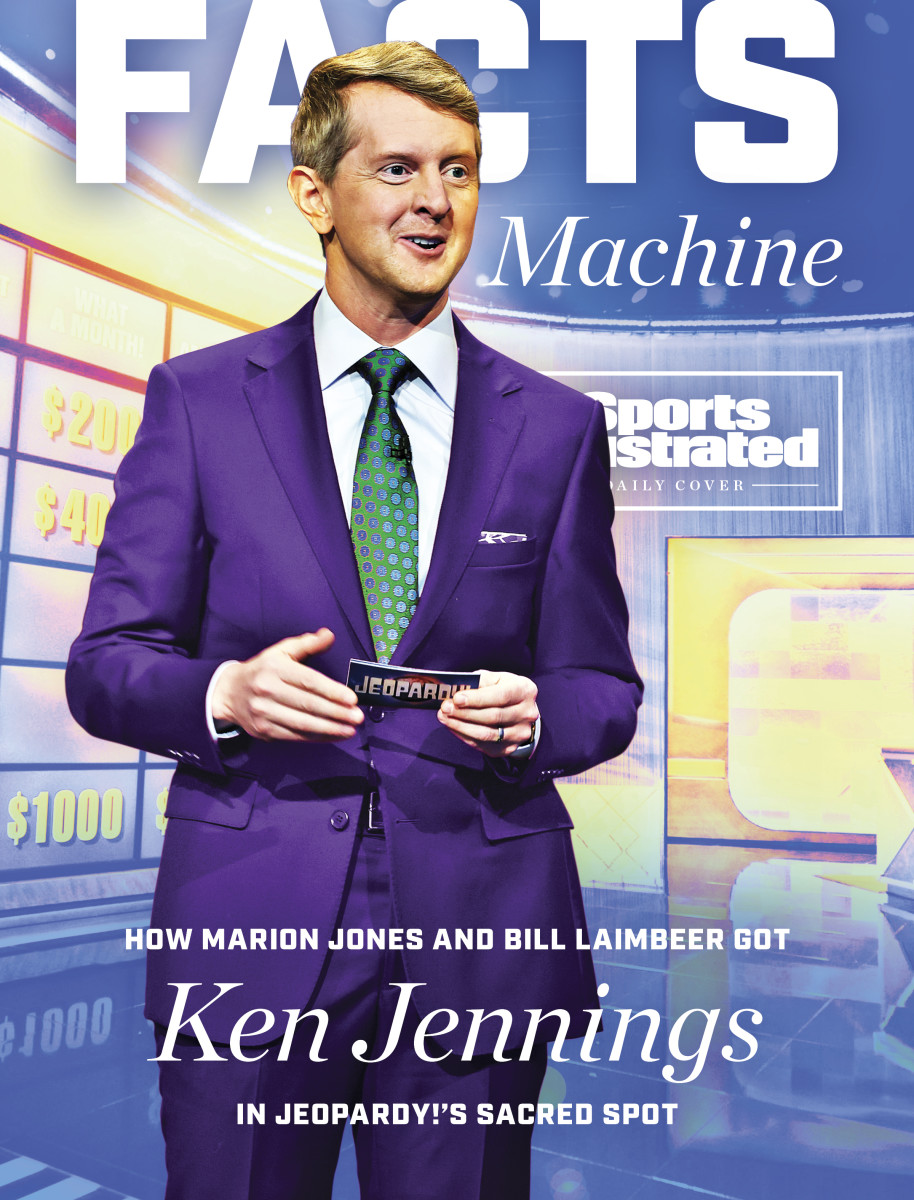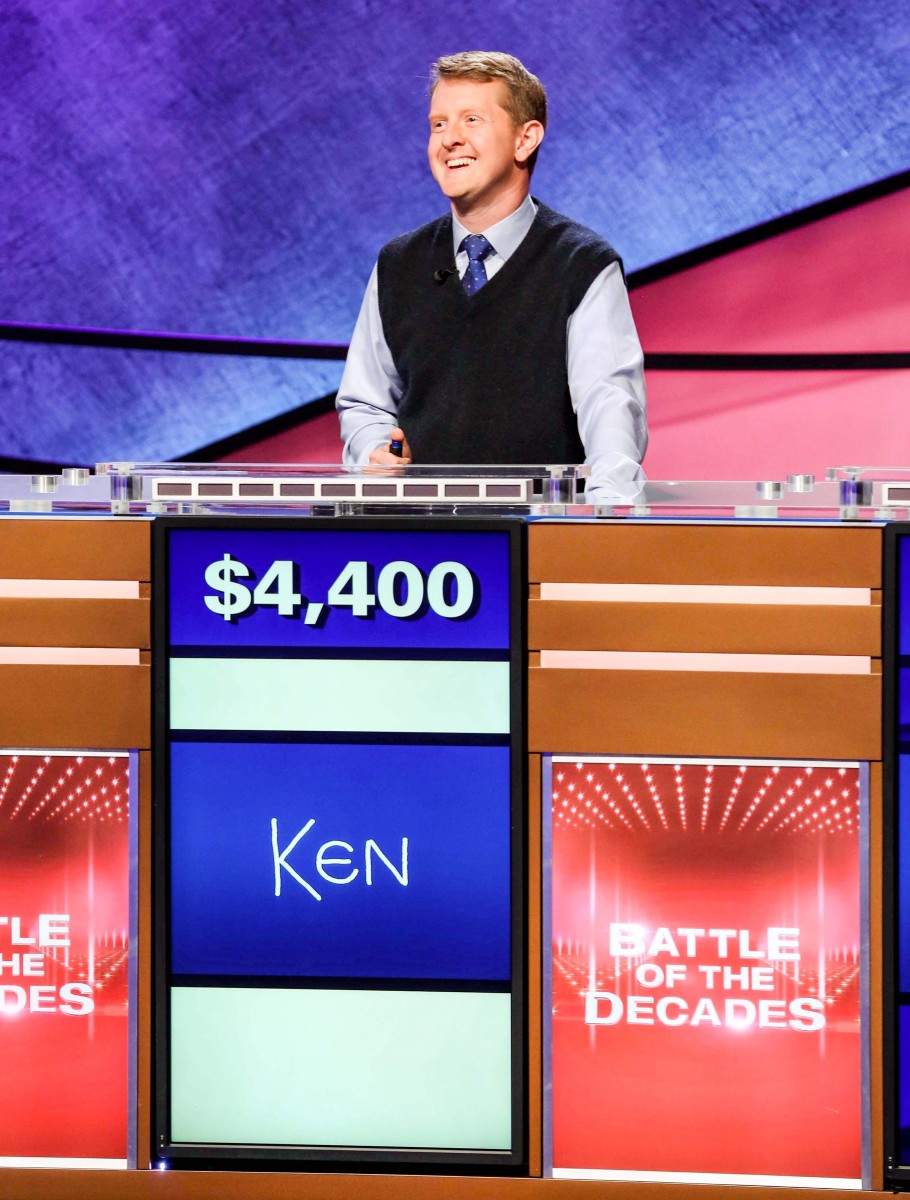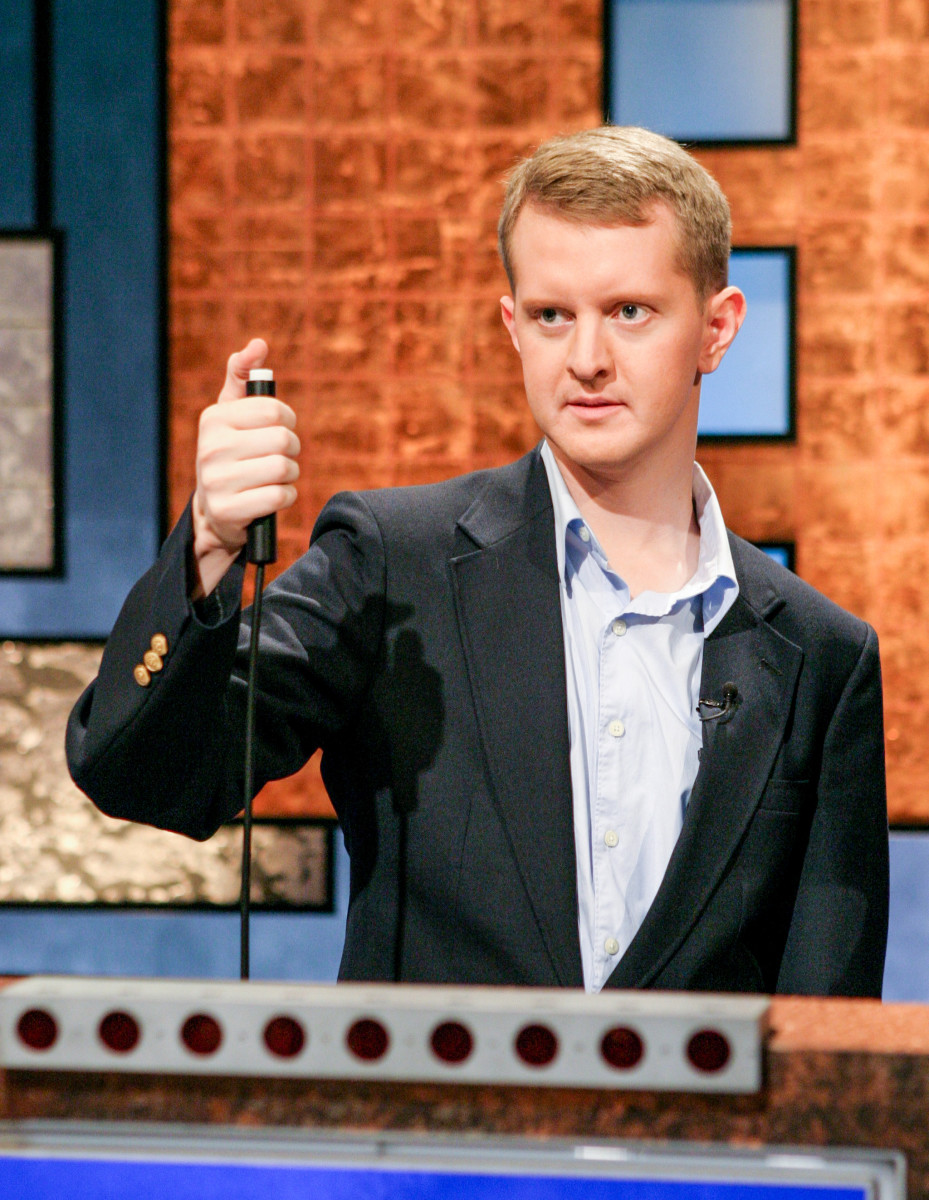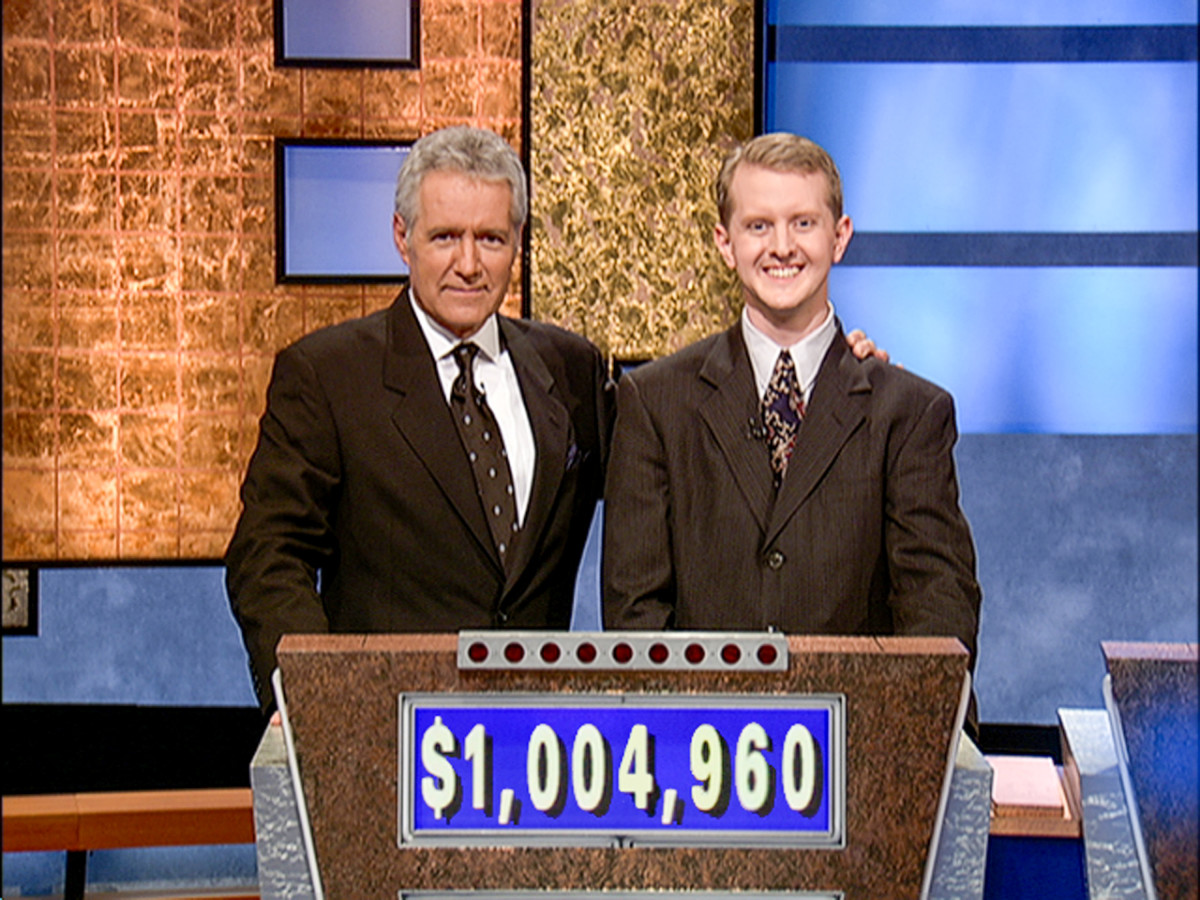“'Tough Acts to Follow' for $800, Please . . . Ken”
The Pacific Northwest is renowned for its forest-dwellers, among them Bigfoot, the Brawny paper towel guy and sky bandit D.B. Cooper, who bailed out of a 727 somewhere south of Seattle. But the creature who came out of the conifers and shambled up to Ken Jennings one summer day as he watched his son and daughter swim in a lake in the Cascades was of another genus entirely. “Which 1980s new-wave band . . .” began the middle-aged man, by way of posing a trivia question. Reports Jennings: “There were no preliminary words. He just emerged from the woods to ask me about Joy Division.”
Jennings is the all-time champion on the quiz show Jeopardy!, and these people who approach him typically spent solitary adolescent hours communing with The Baseball Encyclopedia, lost in the corn maze of the Internet Movie Database or standing in an aisle at Waldenbooks, gazing into The World Almanac and Book of Facts. The 46-year-old Jennings, though, is never alarmed by these pop quizzes posed to him in the wild. He understands. “I kind of feel like I’ve found my people,” he says.

Those people are legion. When Jennings faced fellow Jeopardy! titans James Holzhauer and Brad Rutter in a weeklong million-dollar GOAT rodeo that aired last January, the show averaged more than 14 million nightly viewers (which topped the World Series ratings from that fall). Jennings won, bringing his lifelong Jeopardy! haul to more than $4.5 million. “I vow to be the People’s Champ,” he tweeted afterward, echoing Muhammad Ali (or possibly the Rock), for there is a pugilistic quality to Jeopardy!
Every show begins with 96-year-old announcer Johnny Gilbert intoning “This is Jeopardy!” in what sounds like a call to arms, the intellectual equivalent of Michael Buffer’s “Let’s get ready to rumble.” The crucial difference: Jeopardy! combatants improve brains rather than scramble them. “It’s good for people,” says Gilbert. “Jeopardy! shows you how smart people can be.”
What always set Jeopardy! apart from the manifold quiz shows in television history was its host of the last 37 years, Alex Trebek, a decent man who appeared to have all the answers, and not only because he did. When Trebek died on Nov. 8 of pancreatic cancer, at age 80, his admirers emerged from the metaphorical woods to pay tribute. He “educated millions around the world,” said Justin Trudeau, prime minister of Canada (from which Trebek hailed), “instilling in so many of us a love for trivia.” The astrophysicist Neil deGrasse Tyson tweeted: “He nurtured a television safe-space for smart people.” Among those smart people in thrall to Trebek was a self-described “nerdy kid growing up in Ohio” named John Stephens, who later took the stage name John Legend, as well as another nerdy kid raised in Seattle and Seoul: Ken Jennings, who on Monday will become the first interim host of Jeopardy!, followed by other interim hosts in the weeks to come. Jennings is the oddsmaker’s favorite to become the permanent host, ahead of ABC newsman George Stephanopoulos and actor LeVar Burton (the preferred choice in some social media circles). To that end, he has been watching hours of game tape of his predecessor, trying to discern the late host’s elusive magic.

“What has surprised me is his light touch. He’s doing a lot of things at once,” says Jennings, still speaking of Trebek in the present tense. “At a mechanical level, he has to deliver 60 clues perfectly to the contestants,” reading each precisely as it appears on the game board, without any verbal hiccups that can throw off the contestants’ buzzer timing, a crucial element for success. Trebek also acted as a kind of play-by-play announcer and color analyst. “He’s contextualizing the game for the audience,” notes Jennings. “But he’s also a referee . . . making calls on the fly regarding timing and correctness.” Indeed, it was Trebek who manually operated a buzzer behind his lectern that timed out contestants who were late in answering. (That system has since been modernized, with a dedicated timekeeper offscreen.)
“He’s got this incredibly complicated, multifaceted job,” says Jennings, but at the same time Trebek “does so much less than you think. He does the minimal amount. He never seeks the spotlight; he makes it all about the game and the contestants.” Often, while going to a contestant on a Daily Double answer, Trebek would just look at the contestant in anticipation. Players, in turn, longed for Trebek’s approval, as did viewers at home.
The boy whose childhood fantasy was to host a game show wishes he weren’t hosting this one—at least not under these circumstances. “When I hear that music,” says Jennings, of the Jeopardy! theme written by the show’s creator, Merv Griffin, “I want to see Alex out there too, you know? I’m right there with the viewer. In a perfect world, that’s Alex’s job. And he was perfect at it.”
Instead—for the moment, at least—the role falls to Jennings, who was hosting Family Feud and Wheel of Fortune at age “five or six” in his Seattle family room, furiously scribbling and erasing puzzles and answers on a chalkboard, mimicking Richard Dawson’s patter: “Show me . . . apple pie!” One year at Christmas he asked for and received the Feud home game, one of the “parting gifts” that shows used to offer their runners-up, along with Turtle Wax and Rice-A-Roni and other products that enchanted kids enduring sick days home from school, their chests embalmed in Vicks VapoRub. Through game shows, Jennings learned the geography of Southern California (She’s a homemaker from West Covina!) and grew starry-eyed whenever “promotional considerations” compelled a show to announce where that day’s contestants were lodged. “Wow,” he says now, as if still staring into the bottle-green glass of a late-’70s television set. “I wanna stay at that Best Western too!”
Grade-school Ken Jennings knew which hosts wore which clothes. They were usually from Botany 500 or—the gold standard—Mr. Guy of Beverly Hills. It was another Guy who lent the archetype of a 1970s game-show host, a glad-handing Muppet who played Trebek’s antithesis. Guy Smiley, of Sesame Street, introduced preschool kids to the tropes of the genre. “Game shows were so formative to me, and maybe to my whole generation as kids,” says Jennings. “We associate them with sick days and good memories.”
When Jennings was seven, his father accepted a job at a law firm in South Korea and the family moved to Seoul, where in a sixth-grade assignment on endangered species Ken was assigned the seal. He called his presentation Seal of Fortune. Another lucky classmate, Tom, landed a different animal and called his report Jaguardy!

Before the word was applied to streamed media, Jennings binged on VHS tapes sent from friends and family back in the U.S. (Particularly memorable were the commercials unspooling on his VCR, especially Jim Varney—Ernest P. Worrell—for a “West-Mex” fast-food chain: “Hey, Vern, ain’t that Taco John’s sumthin’?”) “There was no Little League [in Korea],” Jennings reports, but there was the entire run of In Living Color, which he says he watched four times, committing entire sketches—Fire Marshall Bill, Homey D. Clown—to his prodigious memory.
At school, a Jeopardy! tie-in book was passed among classmates like a secret note. That show was consumed secondhand, from a hemispheric remove, in the same way that American sports were. Jennings, who enjoyed shooting hoops with his buddies, grew enamored of the Bad Boy-era Detroit Pistons. “I thought John Salley was so funny; Bill Laimbeer was tough; and I knew James Edwards had gone to the University of Washington,” he says, jumping to pre-empt the next question. “It says nothing about me, I think. I’m not that kind of competitor, throwing elbows on Jeopardy!”
And yet, many Jeopardy! contestants are still not sports fans. Sports, Jennings notes, is a siloed subgenre of trivia: sui generis, self-contained. “Anybody who’s played bar trivia knows you need to have one sports person on your team,” he says. “He or she is there just for the sports questions.” Likewise, a viral video from 2018 captured all three Jeopardy! contestants, one of whom defiantly wore a bow tie, blanking on each of the five clues in the Talkin’ Football category, to the mock dismay of Trebek, who sighed while throwing to commercial: “I have to talk to them.”
“Jeopardy! is different,” Jennings says. “Those [contestants] are generalists and know a little bit of everything, but—possibly as a result of the long jocks-versus-nerds struggle in American life—they’ll miss a question about Tom Landry, where they would never miss one about Tom Daschle.”
Jennings straddles the “versus” in jocks-versus-nerds. A passing knowledge of sports has been critical to his Jeopardy! success. He knows both Landry (the former Cowboys coach) and Daschle (the former U.S. senator from South Dakota). Six years ago, when Jennings took his then 11-year-old son, Dylan, to a popular father-and-son sex-education class in Seattle—subcontracting “the talk” to a professional—he recognized another dad sitting near him: P.J. Carlesimo. Jennings couldn’t imagine what the longtime basketball coach was doing in Seattle, failing to remember that Carlesimo had once led the SuperSonics.
“I had to Google it,” says Jennings, and the revelation is somehow jarring, like seeing Superman on Spirit Airlines, ensconced in a middle seat.
His origin story is straight out of DC or Marvel. In 2004, Jennings was a computer programmer in Salt Lake City when he and his buddy Earl Cahill, armed only with a book called How to Get on Jeopardy! . . . and Win!, drove 700-odd miles to Los Angeles, where tryouts were being held in the conference room of a Culver City hotel. It was the Radisson, alas, and not the Best Western of his game-show-lodging fantasies.
Even so, he passed the test and crammed nightly, faux-buzzing in on toddler Dylan’s Fisher-Price rings-on-a-spindle toy. A teetotaling Mormon who has never known the potency of a potent potable, Jennings memorized cocktail recipes to prepare for that popular category of Jeopardy! questions, an experience he recounts in his memoir, Brainiac, which doubles as a Homeric journey through the more trivia-centric precincts of America, from college quiz bowls to the writers’ room at Who Wants to Be a Millionaire?
In answer to that last rhetorical question: Jennings won 74 consecutive games of Jeopardy! between June and November of 2004, becoming a millionaire—$2,520,700, to be exact—even after the 35% federal tax, 7% California tax and his 10% tithe were removed. The renown accorded this Jeopardy! fixture was, as Trebek already knew, disorienting. In his early days as host, Trebek had been bewildered to learn that both Frank Sinatra and Jimmy Stewart were fans of the show. The latter-day Jimmy Stewart, actor and vintage-typewriter enthusiast Tom Hanks, sent Jennings a lovely note of praise, a fact that Jennings today coughs up only under duress, after some light browbeating. (“It sounds braggy,” he protests). The note was typewritten. “That,” says Jennings, “is how I knew it was really Tom Hanks.”

His fame (“a very manageable level,” he insists) has a shape-shifting quality, reflecting the importance of syndicated television in the lives of people who are home at 11:30 a.m. in Houston, 2 p.m. in Kansas City, and 7 p.m. in San Francisco. Jennings has been recognized in public during the coronavirus pandemic while wearing his mask. “What are they recognizing on me?” he wonders. “My lack of eyebrows?”
Even after nearly two decades, he is still surprised by it all. “It feels like a little club,” he says of his fellow Jeopardy! fans. “But of course, it’s a big club. It’s tens of millions of people.”
Taking over for Trebek, even temporarily, has brought greater scrutiny still. The Jeopardy! lectern is a Maserati. “I would feel like I was letting Alex down if I scratched the paint,” Jennings says. Over the holidays, Jennings apologized for some offensive social media posts in his past, one of which disparaged people with disabilities. “Sometimes I said dumb things in a dumb way and I want to apologize to people who were (rightfully!) offended,” he tweeted, adding, “I screwed up, and I’m truly sorry.” Of the lessons he has learned, Jennings wrote: “If 2020 has taught us anything, it’s that we should be kinder to one another.”
Toward that end, he hopes Jeopardy! can be one small binding agent in a divided America. In a nation where facts are increasingly derided as fiction, and fiction is often presented as fact, everyone can agree that “Reaching this tessellated banner first means you’ve won an auto race.” (What is a checkered flag?)
“It actually gives me hope, because Jeopardy! has a super-broad appeal in every part of America,” Jennings says. “It’s an apolitical, across-the-aisle kind of show. Red states love Jeopardy!, blue states love Jeopardy! . . . There’s this baseline thing where, despite our biases, we love this show where questions have right answers and they get wrapped up and there’s this knowledgeable voice of authority saying No, no, no, no; I don’t think so; you added a letter G to the end of that clue and I’m afraid that’s incorrect, and we move on.”

The annus horribilis just past taught him another lesson. As a contestant, Jennings’s relationship with Trebek had been necessarily distant; this is mandated by federal law, a result of the quiz-show scandals of the 1950s. But during Trebek’s public reckoning with pancreatic cancer, Jennings saw—as a viewer, as a 2020 contestant and as a consulting producer on Jeopardy!—the host’s courage and decency in the face of mortality. “That’s where I think America got to know him,” he says. “To see how he responded to that diagnosis, how open he was. He was so candid about the struggles, the mental health challenges. For somebody of his generation to talk that way to millions of people, that really showed you what kind of a person he is. [Ordinarily,] somebody’s affect at a game show lectern is not revealing. That really touched me, and I valued the time I got to spend with him toward the end of his life.”
If not for Trebek, Jennings’s record run in 2004 might never have begun. On the very first show of that streak, the Final Jeopardy! category was 2000 Olympics. With the game’s result still very much in play, the clue Trebek read was: “She’s the first female track-and-field athlete to win medals in five different events at a single Olympics.” Jennings’s closest competitor answered correctly: “Who is Marion Jones?” But Jennings had been taught, during his quiz bowl competition days as an undergraduate at Brigham Young, to answer with as little information as necessary. So he had written only, “Who is Jones?” There followed a momentary panic when he wondered whether another Jones had medaled in Sydney, or whether the very surname—so common as to pass for a generic answer—might be judged as a wild guess. For a brief eternity, Trebek looked off set, to another judge, who finally shook his head yes.
A passing knowledge of sports had saved Jennings, as had a nod from Trebek, the most important judge. “That’s the moment it all hinges on,” says Jennings of the split-second decision to accept a Marion-free Jones. “It’s comforting to think of the world as a meritocracy, that the right people succeed, but that’s not always true. My whole life hinges on whether or not I put a first name down and whether the judge nods right there. I feel extremely fortunate and I think about it literally every day, because I love what I do.”
And had Trebek shaken his head no, said “I’m sorry,” and sent Jennings home without so much as a lovely parting gift? “I’m a zero-day Jeopardy! champion,” he says—and still a computer programmer in the burgeoning tech center of Salt Lake City, vaguely dissatisfied with his job, but still a contented husband and father to Dylan, now 18, and Caitlin, 14. “I could never afford a house here in Seattle without the Jeopardy! money,” he says. “But I’d still have my family, we’d still have all our traditions and vacations, my kids would still be heading off to college soon and it would be . . . fine. But I don’t think I would watch Jeopardy! anymore. That would be a [bad] memory.”
Instead, he has been literally sized up as the show’s next host, outfitted by the Jeopardy! wardrobe department—and not, alas, by Mr. Guy of Beverly Hills. Jennings drove by the former storefront on Rodeo Drive, confirming that the shop—like its namesake, the late Guy Greengard—is no longer with us.
During one of his first “nerve-wracking” tapings as host, Jennings made a verbal stumble while reading the last word of a clue. He knew instantly, as a former contestant, what the audience did not: that he had thrown off the players’ buzzer-timing. When Jennings called his wife, Mindy, later that day—Jeopardy! tapes five shows in a day—she asked, “How did it go?”
“You’re gonna be shocked to hear that I’m no Alex out there,” Ken said.
To which Mindy replied, “Well, maybe on his first day, Alex wasn’t either.”
Jeopardy! has afforded Jennings—even more than the money and renown—the fullest expression of his creativity. He has written books about geography wonks (Maphead) and our comedy culture (Planet Funny); he creates puzzles for Mental Floss; and he appeared as himself on Sesame Street and The Simpsons, where he was introduced to Homer as “Jeopardy! champion-of-champions Ken Jennings.” In November he joined Doja Cat and Post Malone as 2020 Grammy nominees, for narrating the audiobook of Trebek’s memoir. On his tax return, Jennings lists his occupation as writer—but only, he says, because “interim game show host doesn’t fit in that little box.”
But that’s what he is, starting Monday, imbued with the Trebekian superpower to change lives by nodding his head. “Thank you for reminding me,” Jennings says to this. “I think about that literally every second I’m at the lectern.”
That lectern awaits him on the famous Stage 10 set on the Sony lot, the same studio where CHiPs filmed from 1977 to ’83, when Jennings was a child besotted by television. “It just seems like such a weirdly specific blessing for a super fan to get to be associated with the game he loved so much as a kid,” he says of his Narnia-like journey through the TV screen. “You hear this all the time from athletes: I can’t believe I’m actually in the Hall of Fame. It’s a super weird feeling. I don’t know why me. But I feel so lucky.”
